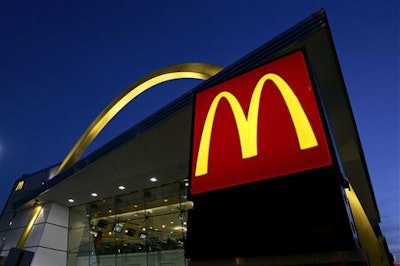
 McDonald's wants to simplify, simplify, simplify — but also add a bunch of choices for customers to avoid growing stale.
McDonald's wants to simplify, simplify, simplify — but also add a bunch of choices for customers to avoid growing stale.
CEO Steve Easterbrook said Monday that he will strip away the bureaucracy at McDonald's so the company can move more nimbly to keep up with changing tastes. The overhaul comes after McDonald's saw its profit drop 15 percent last year, with sales dipping in regions around the world.
"The reality is our recent performance has been poor. The numbers don't lie," said Easterbrook, who took charge of the world's biggest hamburger chain on March 1.
To help make the right changes more quickly, McDonald's said it's restructuring its business into four units led by lean management teams.
The U.S. market, which accounts for more than 40 percent of operating profit, recently stripped away a level of field oversight and will be its own unit.
Another unit will be made up of established international markets such as Australia and the United Kingdom, and another with high-growth markets such as China and Russia. The countries where McDonald's has a smaller presence will be grouped separately.
Previously, the units were segmented by geography rather than market type.
Already, McDonald's has acknowledged the need to simplify food preparation as well. The company has already trimmed its menu to reduce complexity for workers and make it easier for customers to decide what they want.
Even as it embraces the mantra of simplification, however, McDonald's is eyeing a host of new options to prevent its image from growing stale.
The company is testing an all-day breakfast menu in San Diego and a "Create Your Taste" option that lets people build their own burgers. Janney analyst Mark Kalinowski has also noted the company is testing a scaled down version of that program called "Taste Crafted" that is available at drive-thrus.
And on Monday, McDonald's launched delivery in New York City in partnership with delivery service Postmates. It plans to offer a mobile app in the U.S. later this year as well.
In a call with reporters, Easterbrook said such moves are about offering more choices and not adding complexity.
"This is about being a better McDonald's, not a different McDonald's," Easterbrook said.
Larry Light, who served as chief marketing officer of McDonald's between 2002 and 2005 and now runs a brand consulting firm, said Easterbrook offered little in the way of what matters to customers.
"Being more efficient, having less bureaucracy will buy you time, but will not buy you enduring success," he said.
When McDonald's was trying to turn around its business in 2002, Light said it focused on addressing the quality of the food, which had degraded over time. For instance, he said the company had stopped toasting Big Mac buns to speed up service.
Changing that helped the company reconnect with its existing fans.
"Now McDonald's is more concerned about the customers that go to Chipotle," Light said.
McDonald's, based in Oak Brook, Illinois, also said Monday that 90 percent of its more than 36,200 restaurants around the world will be franchised over the next four years. That's up from 81 percent, and will mean the company will rely more heavily on franchising fees and move away from the daily work of running restaurants.
The organizational changes will contribute to $300 million in cost-cutting targeted by McDonald's, most of which will be realized by 2017. Without providing details, Easterbrook said the cost-cutting will affect jobs.
Wall Street wasn't impressed with the presentation. McDonald's stock fell 1 percent to $96.65.
Easterbrook, who previously headed up the U.K. business, has described himself as an "internal activist" and says he wants to turn McDonald's into a "modern, progressive burger company."
McDonald's annual shareholder meeting is May 21.






















